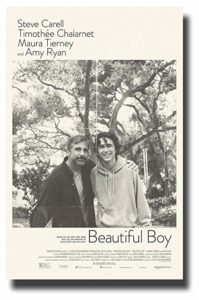Beautiful Boy
Posted on October 18, 2018 at 5:18 pm
B +| Lowest Recommended Age: | High School |
| MPAA Rating: | Rated R for drug content throughout, language, and brief sexual material |
| Profanity: | Very strong language |
| Alcohol/ Drugs: | Extended and explicit substance abuse |
| Violence/ Scariness: | Tense family confrontations, peril, serious medical issues |
| Diversity Issues: | None |
| Date Released to Theaters: | October 19, 2018 |

While both books formed the basis for the film, most of it is from the perspective of the father, David (Steve Carell), who lives in a dream of a home in Marin County with his artist/earth mother of a second wife (Maura Tierney, great as always) and two angelic small children. David lives a dream writer’s life, with profiles of the world’s most accomplished and interesting people in publications like Rolling Stone. He has a warm, loving relationship with his son from the first marriage, Nic (Chalamet). Perhaps because he likes to think of himself as young and does not want Nic to think of him as out of touch, perhaps because he and Nic’s mother are divorced and he wants to make sure his time with his son is pleasant, perhaps because he is too indulgent, when Nic offers him some weed, he laughs and takes a couple of hits. After all, Nic is doing so well in school and is so gifted and so, well, beautiful (even Chalamet’s stunning performance cannot distract us from the wonder of his hair), and it’s a beautiful day, so why not?
David does not know that Nic has gone past some recreational marijuana use. He is addicted to methamphetamines, and as we will learn from the expert David consults (Timothy Hutton), that drug changes the brain chemistry to make the addiction especially intractable. Apparently he has not been truthful about why he is there. The doctor thinks it is for a magazine story. But when David explains he is there for personal reasons, the doctor is sympathetic. David says he has just two questions: What is this doing to Nic and how can he help? Both answers are far from what he had hoped.
The movie goes back and forth in time, intended to show us David’s painful memories of happier times and his increasing understanding of how little he can do to fix this problem. But it gets discursive and distracting, making it difficult for the story to gain momentum.
And it never gets past the privileged, secular version of revival meeting testimony, another “was blind but now I see” story of a prodigal son who hit bottom, then went lower, then went even lower, and then found his way home, in part because he was born into a family that made it possible to treat his addiction as youthful folly and a medical problem and not a crime.
Carell is very good as the anxious, frustrated, and embarrassed father, who keeps trying to insist that he and Nic were closer than most fathers and sons, and that “this is now who we are” until he has to admit that this is exactly who they are. But it is Chalamet who takes this out of the category of just another Lifetime movie about heartbreak in suburbia. While the movie goes back and forth in time, Chalamet is always astonishingly precise about where Nic is on his slide to the bottom, whether he is strung out, in denial, trying to manipulate his family, terrified, or just whacked out of his head. It’s a dozen performances in one, each one a complex, beautifully observed portrait.
It is too bad it is not in a better movie. Perhaps because it tries to cover both books, it lacks focus. What is the lesson here? That parents have to accept that they cannot fix their children? That this country needs a better drug policy? Most likely it is that if you’re going to be a teenage drug addict, it’s better to be from a white family with money to pay for repeated stints in rehab.
Parents should know that this film focuses on drug addiction, with extensive and explicit substance abuse, strong language, medical issues, and sexual references and a situation.
Family discussion: Could Nic’s parents have done anything different to help him? How do the lyrics of the title song help to explain the movie’s themes?
If you like this, try: “thirteen,” “Ben is Back,” and “Augusta Gone”
